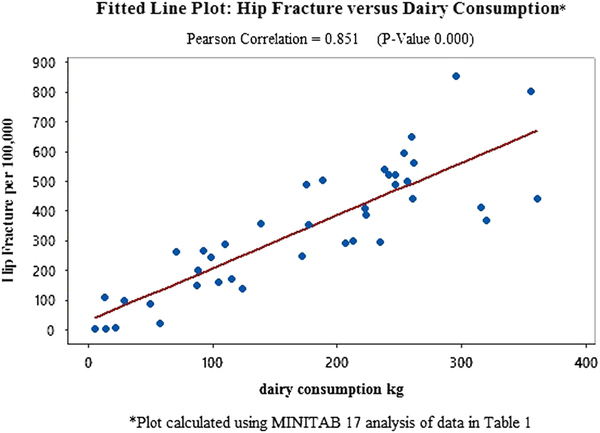The infamous “Got Milk?” campaign reads like a who’s who of famous athletes and celebrities known the world over. In fact, you’d be hard-pressed to find an A-lister who hasn’t posed donning the famous milk mustache. As an accompaniment to their fierce looks, strong physique and milky mug, powerfully worded quips such as “Want strong kids?” or evidence speaking to the many benefits of milk are always found nearby.
Milk contains calcium. Calcium builds strong bones. What is there to argue?
Plenty.

The idea that drinking milk, or simply getting adequate calcium in your diet, somehow yields strong bones or a decreased risk of degenerative bone diseases such as osteoporosis, is simply not the case. The plot above (source: Nature.com) shows the correlation between calcium consumption of over 40 world nations, and the incidence of hip fractures in each country.
The data is clear as day: more calcium in the diet does absolutely nothing to deter fractures or osteoporosis, as advertised. It even appears to have the opposite of the desired affect.
 What then, if anything, makes strong bones?
What then, if anything, makes strong bones?
There is a principle in kinesiology known as Wolff’s Law, stating that a bone will grow and adapt, over time, to the stresses under which it is placed. In Layman’s terms, excess mechanical stress builds strong bones, and not the consumption of some purportedly miracle nutrient.
This means that to build bone density and ward off degenerative bone diseases such as osteoporosis or age-related fractures, we need to subject our bones to resistance training on at least a semi-regular basis.
Add that to the growing list of reasons to exercise.
Why else we should re-think milk and dairy consumption.
As a human, ingesting dairy doesn’t make sense. I defer to Michael Klaper, MD, to explain further:
(Click here to be directed to YouTube if video loads incorrectly)

Cow’s milk is just one of a host of animal products that show an alarmingly linear relationship with diseases of affluence. These diseases include: Type I diabetes, hypertension and other diseases of the heart, and cancers of almost every variety. Chart 9.3 indicates the relationship between cow’s milk consumption and Type I diabetes in wealthy countries. While in science it is important to remember that correlation does not directly prove causation, the overwhelming picture drawn by the data, in my view, is becoming harder to ignore.
Where do we go from here?
Allow me to be clear, I am not suggesting that we all give up dairy tomorrow. To be sure, its a product that’s been ingrained in our culture for hundreds of years, and is an ingredient in thousands of products we love. The cold turkey approach just doesn’t work.
However, this shouldn’t stop anyone from making decisions in their own life that are guided by the very best information that evidence-based research has to offer. I’ve previously written a guide on adopting more plant-based options into the diet, which you can read here.
As per usual, what you do with this information is up to you!

